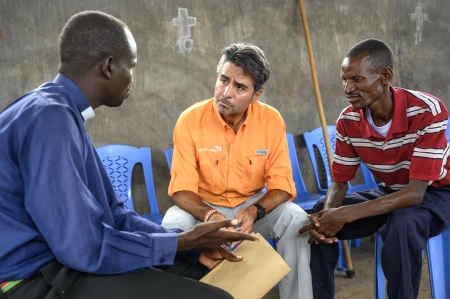As millions face global hunger crisis, World Vision seeks $2 billion for the food insecure

When the Norwegian Nobel Committee awarded the Nobel Peace Prize to the United Nations World Food Programme in 2020 as lockdowns in response to the COVID-19 pandemic began disrupting economies worldwide, it rang the alarm on a looming global hunger crisis.
Now, fresh off a recent trip to Kenya where he visited several food insecure communities, Edgar Sandoval Sr., president and CEO of World Vision USA, recalled how the pandemic, compounded by the war in Ukraine, climate shocks and inflation, has turned the once looming hunger crisis into a present danger for nearly 4 million people in the East African nation and millions of others around the globe.
“I'll tell you what the chief of the village that I visited [in Kenya told me],” he told The Christian Post on Wednesday. “He said, ‘Most people are not working. The rain has disappeared … drought and high prices have been really hard on marriage.’ He said, ‘I can hear them (couples) fighting because there's no food. When the food becomes a challenge, the violence (comes).' That's what he was saying about the home.”
For World Vision, an Evangelical Christian humanitarian aid, development and advocacy organization that is also the UN World Food Programme’s largest partner in food distribution, families are a priority. And the danger Sandoval sees is real.
Skyrocketing prices and high unemployment are a toxic mix for food insecure communities in Kenya.
“If you're still able to make $1 a day, if you're able to make $1 a day, now you're paying … $34 (or more than $4,000 Kenyan Shillings) for a sack of maize. Triple the price that it used to be,” Sandoval said.
In these challenging times, the ongoing hunger crisis brings worry even for food insecure Kenyan families that own something of value, said the World Vision CEO.
“When food is short, there are raids on people's livestock,” he explained.

Due to the ongoing threat of hunger to their families in these food insecure villages, the men, in many cases, have to leave their families to find food in the nearest town that can be hours away by car.
“So they stay there for a month and maybe three months. They may not come back. The children are left with single parents. And so, more kids drop out and on and on until there is this vicious cycle. That's the challenge,” Sandoval said.
Many children are also “acutely malnourished,” Sandoval said.
“The moments of grief started at the dispensary in one of the villages that I visited. I was there when moms were bringing their babies. I saw just too many babies that were acutely malnourished,” he said.
“I talked to the nutritionist, Martha, who has been doing this for six years. And she said to me she's never seen it this bad. She's never seen the level of malnutrition so bad in children,” he added.
About 40% of the children that visited the dispensary Sandoval visited were acutely malnourished.
“There's different levels of malnutrition. Moderately malnourished is not a good thing, either, but it's better than being acutely malnourished. And so the levels are increasing and getting higher, higher than she's ever seen it,” Sandoval explained. “The moms also, lactating moms, are also malnourished.”
Through their deep relationships with churches and their large food distribution network, Sandoval and his staff at World Vision have been working feverishly to leverage their experience in helping food insecure families through Bible-based programs.
One program, he says, seeks to help struggling husbands and wives rekindle their commitment to each other by finding God’s plan for their relationship.
“The outcome is so encouraging. I talked to three couples, and what they told me is, ‘We went from what the chief described — arguing and fighting — and now we have love and unity,’” Sandoval explained. “That's an important part of our intervention.”
To meet the increasing needs of growing food insecurity in at least 25 countries, Sandoval is seeking to raise $2 billion for the effort.
“We are putting the full force of our 70-plus year experience and all our resources into this response. This is job number one. We're doing food distribution; we're doing cash transfers. We're enabling treatments to malnourished children,” the World Vision CEO explained.
He added that “90 percent of all severely malnourished children that we treat, make a full recovery ... it's one of the reasons why we're the largest distributor in the world."
"We know what works; we say that humbly. And we have the infrastructure and staff on the ground to have a big impact,” he said, encouraging people of faith and other donors to give to the cause through World Vision’s website.
On Tuesday, a bipartisan group of senators urged the Biden administration to accelerate delivery as the war in Ukraine pushes more countries closer to famine. They argued that U.S. food aid was taking months to reach needy nations despite an urgent global food crisis, The Washington Post reported.
“Unless the United States translates well-meaning rhetoric and appropriated dollars into a swift humanitarian response, Russia’s crimes against humanity and weaponization of the global food supply will go unpunished,” the senators wrote in a letter to U.S. Agency for International Development Administrator Samantha Power. “The most significant proposal of humanitarian aid in modern U.S. history must be accompanied by an infrastructure that assumes more prudent risk and quickly delivers support.”
The World Food Programme had billed 2022 as “A Year of Unprecedented Hunger.”
The international food relief agency says as many as 828 million people go to bed hungry every night, and since 2019, the number of those facing acute food insecurity has soared from 135 million to 345 million. Some 50 million people in 45 countries, says the agency, “are teetering on the edge of famine.”
“I'm asking everyone, I'm pleading with them to please do something to help us respond to these pressures, especially for children,” Sandoval said.
Pointing out that it only costs $4 a day to feed a family of six in Kenya, he said, “Every contribution helps, no matter the size.”





















